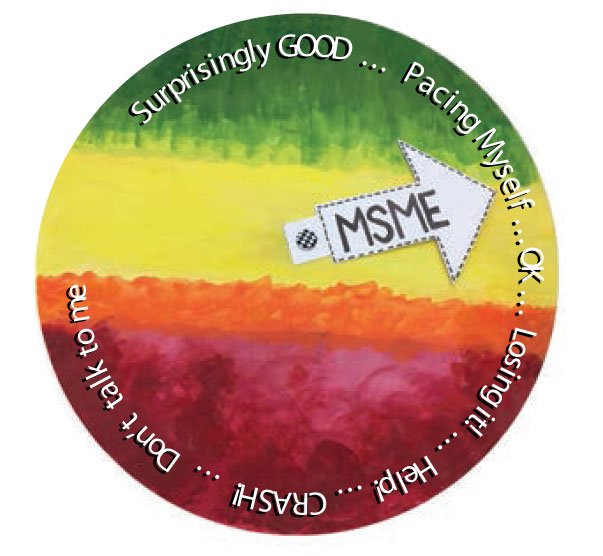
By Nancy Boyd, special contributor to InforMS. In 1999, Nancy Boyd began having problems with vertigo and balance and she lost hearing in one ear. In the process, she had her first brain MRI which showed some lesions that might be MS, and she was also diagnosed with Meniere’s disease. For the next decade, Nancy endured medications, therapies, allergy testing, diets, shots through her ear drum, and two surgeries. Some neurologists said she had MS, some said she didn’t. Eventually, she was diagnosed with MS. Over the years, Nancy has developed some strategies for living with MS and navigating its challenges. She shares some of the unique and personalized strategies and tools she has developed.
Having MS is a boatload of challenges, and that’s speaking politely. Even if you do everything your doctor advises you to do, you’re going to have physical, mental, and emotional fallout to deal with. I have recently given myself permission to implement my own personal strategies, no matter how unconventional they may seem to someone else.
PUPPIES
When I was diagnosed I owned and ran a small business — a super cute little quilt shop, and I loved it. When my lease was up, I had to either move and expand, or close it down.
Considering how MS was treating me at that point in time, I knew I couldn’t take on expansion. I sold my entire inventory and closed, and I was so sad. I went from being busy six days a week to having too much time on my hands.
I felt like MS was taking away my very identity, and I didn’t like the new grumpy, tired, homebound me. So I brought home a puppy. And then a week later, I went and got another puppy. I had to get up in the morning before they did. I had to walk them — and they didn’t mind going slow. I had to train them and work with them and show them off to my friends and family. They were soft and cute and snuggly. And they loved me: instant mood booster. I thought I would train them to be therapy dogs, and we would visit hospitals and cheer up children and old people and victims of tragedies worse than mine. So far, they’re still refining their sympathy skills on me, and we’re okay with that for the moment.
CLEAR COMMUNICATION MS METER
 My poor husband. He really wants to be helpful, but he doesn’t seem to be able to guess correctly every time I need something. This is not his fault. As we all know, some symptoms are quite invisible and they come and go randomly. I have to admit that sometimes I am still crabby, despite the cute puppies. Sometimes that crabbiness erupts most strongly when he asks how I’m feeling. Most people would say that’s not a mean question, but I honestly feel like I can never give the “right” answer (“Oh, I feel so good today, Honey!”) So he would tiptoe around saying, “I know you don’t feel great, but how bad do you feel?” Meaning: “Do you want to go anywhere, or hid in a quiet, dark room?”
My poor husband. He really wants to be helpful, but he doesn’t seem to be able to guess correctly every time I need something. This is not his fault. As we all know, some symptoms are quite invisible and they come and go randomly. I have to admit that sometimes I am still crabby, despite the cute puppies. Sometimes that crabbiness erupts most strongly when he asks how I’m feeling. Most people would say that’s not a mean question, but I honestly feel like I can never give the “right” answer (“Oh, I feel so good today, Honey!”) So he would tiptoe around saying, “I know you don’t feel great, but how bad do you feel?” Meaning: “Do you want to go anywhere, or hid in a quiet, dark room?”
I thought I should give the man some better info. So, I made a paper plate sized meter with an arrow in the center labeled “MSME,” meaning “This is how MS is treating me today. I personally am a nice person, but I may be under attack by a non-nice disease process at this time.” I painted the top green and I added some words to further describe my status.
Since I hardly ever feel great, my top of the cart status is “Surprisingly Good.” Going clockwise, I could be “good,” or slightly lime green “Pacing myself.” I feel it is important to pace myself while still pretty much in the green. Yellow is the OK zone, and as it turns orange, I’m “Losing it.”
Going into red, I left a spot to ask for “HELP!” so he would know I have an actual task for him. He likes tasks because he can truly be helpful, and we can both be happy about that. The pure red zone means that I’ve crashed — I need to lie down and cancel whatever else might have been on the agenda, because I’ve hit my physical limit. Past Crash is the dreaded “Don’t even talk to me” zone. This is when my body and my mood are rock bottom. It means don’t come in and ask me if I want a drink of water or another blanket or to talk to my grandkids on the phone. It means I have hit my limit physically and mentally and I can only cope with taking care of me.
From my husband’s perspective, I think that it has actually given him the ability to be more supportive because it was stressful for him to try to figure out what was going on and to know that he was probably going to guess wrong. So he loved this and asked me right away to please keep it up to date.
WEIGHTED BLANKETS
My most consistent symptoms are vertigo and balance issues. It’s not exactly dizziness, not exactly room- spinning, or falling completely down on the floor. I feel like I am on a swing all the time. Sometimes I swing so high I loop right over the top. Other times it’s less of a swing and more like a small raft in a stormy ocean. Up, down, side-to- side, and a fair amount of queasiness.
It’s always with me, at least to some degree, and I have learned there are things that ramp it up – sound and motion.
Some years ago, I learned about weighted blankets and made a couple for my grandsons who have autism.
Then while doing some physical therapy to work on connecting my brain to sold ground, the weighted blanket appeared again — I could use it to hold myself still. Now, I have a small one for my head, a collar shaped one for my shoulders, several for my lap and a long one for my whole body when I’m lying down. I love them.
I made my own weighted blankets, and if you’d like to do that , there are several tutorials online. There are also many places to buy them already made (check out etsy.com).
FRIED PICKLES
You read that right. And yes, I’m aware they are not a healthy dietary choice. I also eat kale and edamame sometimes, so don’t judge me. But here’s how the fried pickles help me. I don’t eat before MRIs because I don’t trust my MS gut. So I started driving through Good Times after my MRIs. I needed a primal food reward for going through yet another medical moment. I think about Good Times’ fried pickles during the MRIs.
Stomach growling, ears ringing, dye flowing — no matter. There are fried pickles waiting for me down the street. This is my routine. I can do this.
NEW VOCABULARY
I am learning some new words. “No.” “Not for me.” “I can’t do that without help/backup.” “I can’t be the one to do that at all.” “I’m not reliable.” “It’s been rough.” These are things that I used to NOT say, because I would just push through whatever needed to be done if I perceived it to be my responsibility, or even if I just thought I should benice. Now I am a better advocate for myself. I have learned that most people understand, and if they don’t — I don’t care. Because I understand. I’m pacing myself. My dogs need me. I’m going to get a fried pickle. I’m under a heavy blanket.
DEVELOPING YOUR OWN STRATEGIES
I am doing what I need to do, which is anything that helps me feel better. You should, too. Don’t answer every phone call. Get an ice cream cone. Listen to a good book with serious headphones. Get someone to drive for you. Let your friend bring you soup. Buy comfy clothes online. Take your medicine with something tastier than water. There are lots of small things that are kind of nice. Imagine a little something that seems right to you. No, it won’t cure MS, but maybe it can give you one more personal coping strategy. Take it.
There are also fundamentals. It is so important to have a doctor that you feel confident in and equally as important to do the things that they recommend. Not only adhering to the medications, but also physical therapy, and eating healthy, and going for walks, and trying to get good sleep. All of those things have been a challenge for me and I’m continually trying to do them. I believe they make a difference, and I like that they give me a feeling that I can do something – that I have a tool.
I think of the coping strategies in this article as frosting on that cake. They’re smaller things. Try some things that may seem silly or not that big of a deal. You’re not kidding yourself that it’s going to cure your MS. But if you find something that helps you feel a little stronger, or a little more in control, or in a little better mood, or little more compensated for all of the crap that you have to go through, I don’t think anything should be off the list.






